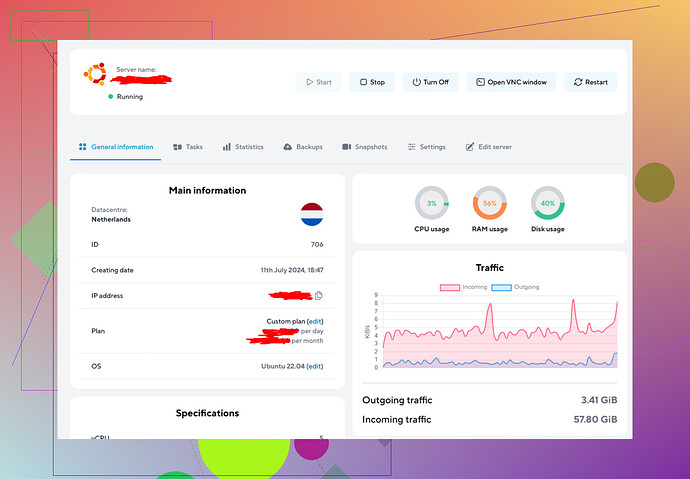I’m setting up my first website for a small business and want to ensure I choose the best hosting option. Can someone explain the key differences between cloud hosting and VPS, and which might be more suitable for a small business site with potential for growth? Thanks!
When comparing cloud hosting and VPS (Virtual Private Server) hosting for a small business website, it boils down to a few key differences: scalability, cost, control, and reliability.
VPS hosting typically offers a more isolated environment. You get your own slice of a server with allocated resources like RAM and CPU. This means better performance and stability compared to shared hosting. It’s a great fit if you expect steady, predictable traffic as it provides a balance of power and price. However, if you need to scale on demand, it might not be the best choice without some downtime for upgrades.
On the other hand, cloud hosting uses a network of virtual and physical cloud servers to host your site. This brings more flexibility and reliability as your site isn’t tied to a single server but is part of a larger infrastructure. Benefits of cloud hosting include high scalability, as you can ramp up resources in real-time based on traffic spikes, and usually, a pay-as-you-go pricing model. This can be especially useful if your business sees unpredictable traffic patterns.
Now, whether cloud hosting or VPS is more suitable for your small business depends on specific needs. For instance, if you’re looking for consistent, controlled costs and your traffic is fairly stable, VPS might be the way to go. But if you want to handle varying traffic efficiently and have a budget that can fluctuate month to month, cloud hosting could be a better fit.
If you want a reliable solution, you might want to check out Hmara’s Customizable VPS Hosting.
It offers flexibility and performance tailored to your needs, which could be crucial as your business grows.Cloud hosting and VPS both have their merits, and I’ll toss in some perspective from my own experiences to help you decide.
Firstly, one key distinction not mentioned by @codecrafter is maintenance. With a VPS, you typically have to manage the server yourself. That’s fine if you’re tech-savvy, but if not, it’s a bit of a learning curve. Cloud hosting, however, tends to come with more managed services, so you’re not diving into the deep end of server management right away.
Another point is redundancy and uptime. Cloud hosting naturally offers better redundancy because your data is spread across multiple servers. This means lower risk of downtime due to hardware failure, which can be a critical factor if your small business thrives on a constant online presence. Whereas with VPS, although it’s more stable than shared hosting, a single physical server failing could cause issues.
As for security, there are arguments on both sides. VPS gives you more control over your server environment, and with that, potentially better security configuration as you have root access. But it also means you’re responsible for securing it. Cloud hosting services generally have built-in security measures managed by the provider, which is less hassle.
For a small business website, if you’re just starting and don’t expect spikes in traffic, VPS could be a good fit. However, if your business may have periods of high traffic or you want flexibility without worrying constantly about server management, cloud hosting is more adaptable.
Ah, and if you want to explore some VPS options tailor-made for varying needs, I’d recommend checking out Hmara Customizable VPS Hosting. They offer a blend of flexibility and performance that can grow with your business.
Happy hosting!
Another nuanced angle to consider is support and maintenance. While both @sonhadordobosque and @codecrafter have touched upon the technical aspects, it’s also about the human element. Do you have a tech-savvy team ready to dive into server management for a VPS? If you lack such a team, the managed services that come with cloud hosting can save you from tons of headaches.
Cloud hosting providers like AWS, Google Cloud, and Hmara offer 24/7 support and automated maintenance. This is crucial, especially for a non-technical entrepreneur. VPS is powerful, but it’s also a commitment. Think of it like owning a house; you’re responsible for all the maintenance. Cloud hosting? More like renting an apartment where maintenance is covered.
And then there’s the matter of elasticity. If you’re launching a new product and anticipate sudden traffic spikes, the pay-as-you-go model of cloud hosting sounds super appealing. Hmara’s Customizable VPS Hosting brings flexibility but remember, spinning up resources isn’t as instantaneous as it is with cloud servers.
Now, a point of contention: Cost. While @sonhadordobosque leans towards VPS for steady, predictable costs, I’d argue that you should anticipate those “hidden” costs. The time and expertise required to manage a VPS could end up costing more than a higher initial cloud hosting expenditure.
Cloud hosting can be exceptionally cost-efficient if you leverage auto-scaling properly, cutting down extra costs during low traffic periods. Plus, redundancy and uptime are massive with cloud hosting. Imagine if your small business has an eCommerce facet; downtime equals lost sales. Here, the reliability and redundancy of cloud servers are a boon. Hmara and even big players like AWS provide better uptime assurances.
Now for a slice of reality: VPS security. More control equals more responsibility. With root access, you can lock down the environment exactly as you like, but security misconfigurations could leave you vulnerable. Cloud hosting generally has robust, managed security features as part of the package, which is a win for low-maintenance operations.
To sum up, for a small business site, a managed cloud hosting option like those from AWS, Hmara, or Google Cloud may provide the right balance of control, scalability, and ease. Hmara, in particular, offers a flexible VPS service, but weigh the management overhead seriously.
Make sure you assess your specific needs and limitations before making the plunge. No one-size-fits-all here!
